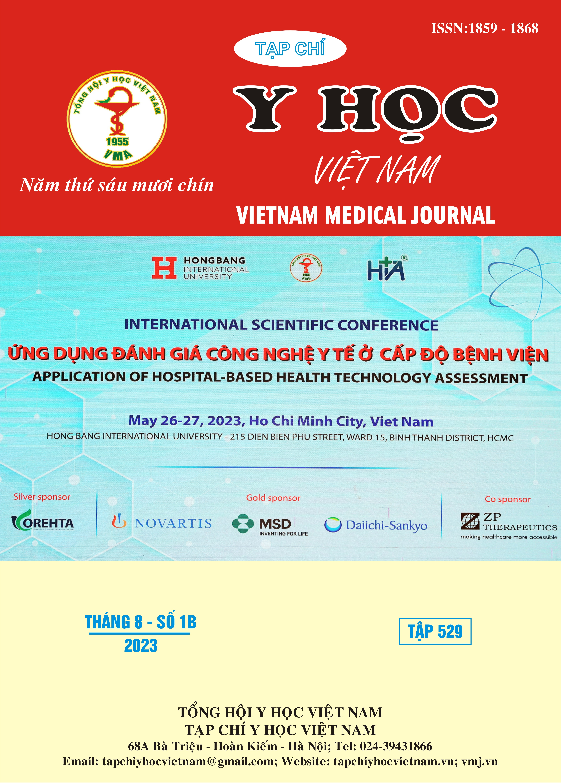SURVEYING VARIANTS RS757110 IN TYPE 2 DIABETES PATIENTS BY ARMS-PCR
Main Article Content
Abstract
Background: Type 2 diabetes is a chronic disease with genetic predisposition. Several studies have shown the association between type 2 diabetes and certain single polymorphisms, including rs757110 of ABCC8 gene. Sanger sequencing, so far, is the gold standard for determining single nucleotide polymorphism, but it is costly and time consuming. Therefore, it is necessary to develop a method that provides accurate information and is simple enough to be widely applied. Objectives: To develop a protocol to determine single nucleotide polymorphism variants rs757110 in patients with type 2 diabetes. Methods: The study was carried out on DNA samples isolated from the blood of 50 patients with type 2 diabetes and 50 controls. The rs757110 variant was identified by Tetra-ARMS PCR combined with Sanger sequencing. Results: Rs757110 was successfully identified by tetra-ARMS PCR. Rs757110 was in Hardy-Weinberg equilibrium with p-value = 0,83. The G allele frequencies were 0,44 and 0,27 in the patient and control samples, respectively. The G/G genotype increased the risk of type 2 diabetes compared with the T/T genotype (OR=9,67, 95%CI=1,92-48,8, p<0,05). The T/G genotype increased the risk of the disease compared with the T/T genotype (OR=3,23, 95%CI=1,11-9,39, p<0,05). Conclusion: We have successfully built a procedure to identify the single nucleotide polymorphism variants rs757110 with high sensitivity and specificity. This variant has been shown to be associated with type 2 diabetes.
Article Details
Keywords
type 2 diabetes, rs757110, ABCC8, Tetra-ARMS PCR
References
2. Saeedi P, Petersohn I, Salpea P, Malanda B, Karuranga S, Unwin N, et al. Global and regional diabetes prevalence estimates for 2019 and projections for 2030 and 2045: Results from the International Diabetes Federation Diabetes Atlas, 9(th) edition. Diabetes research and clinical practice. 2019;157:107843.
3. Gonen MS, Arikoglu H, Erkoc Kaya D, Ozdemir H, Ipekci SH, Arslan A, et al. Effects of single nucleotide polymorphisms in K(ATP) channel genes on type 2 diabetes in a Turkish population. Archives of medical research. 2012;43(4):317-23.
4. Remedi MS, Koster JC. K(ATP) channelopathies in the pancreas. Pflugers Archiv: European journal of physiology. 2010;460(2):307-20.
5. Truong S, Tran NQ, Ma PT, Hoang CK, Le BH, Dinh T, et al. Association of ADIPOQ Single-Nucleotide Polymorphisms with the Two Clinical Phenotypes Type 2 Diabetes Mellitus and Metabolic Syndrome in a Kinh Vietnamese Population. Diabetes, metabolic syndrome and obesity: targets and therapy. 2022;15:307-19.
6. Ehnert S, Linnemann C, Braun B, Botsch J, Leibiger K, Hemmann P, et al. One-Step ARMS-PCR for the Detection of SNPs-Using the Example of the PADI4 Gene. Methods and protocols. 2019;2(3).
7. Jin C, Li Z, Zheng X, Shen K, Chao J, Dong Y, et al. Development and validation of T-ARMS-PCR to detect CYP2C19*17 allele. Journal of clinical laboratory analysis. 2020;34(1):e23005.
8. Zhang S, Dang Y, Zhang Q, Qin Q, Lei C, Chen H, et al. Tetra-primer amplification refractory mutation system PCR (T-ARMS-PCR) rapidly identified a critical missense mutation (P236T) of bovine ACADVL gene affecting growth traits. Gene. 2015;559(2):184-8.


